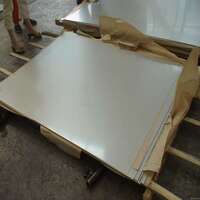A titanium plate is a metal plate made from titanium as a raw material. Titanium is a very special metal with a very light texture, but it is also very tough and corrosion-resistant. It will not turn black like silver and will maintain its color tone for life at room temperature. The melting point of titanium is similar to that of platinum, and it is widely used in industries such as metallurgy, electronics, medical, chemical, petroleum, pharmaceuticals, aerospace, etc.

titanium plates
Characteristics of titanium plate
Titanium plate is a surface oxide film that acts as a good, durable, and wear-resistant separation agent. Using titanium plates saves separation agents, making it easy to peel off the electrode plate and eliminating the need for pre-treatment. Titanium plate is half lighter than copper plate.
The service life of titanium plate is more than three times that of copper plate, and can reach 10-20 years according to operating conditions.
Electrolytic copper produced from titanium plates has a dense crystal structure, smooth surface, and excellent quality.
Due to the fact that titanium plates do not require the application of separation agents, contamination of copper electrolytes can be avoided.
Improve production capacity and reduce the production cost of electrolytic copper, thereby achieving better economic benefits.
Application of titanium plate
Aerospace
In aerospace applications, titanium plates are usually more popular than aluminum. Its corrosion resistance and heat resistance make it a suitable choice for aircraft, fuselage, engine components, and aircraft landing gear.
C.P. (Commercial grade) titanium is the preferred material – it has low density but high strength, stronger plasticity, and is lighter in weight than steel. Of course, due to its high cost, its application may be limited, but it is still a useful material that is gaining popularity due to its reliability and excellent quality.
Automobile
Titanium is a high-grade metal with special applications in automobiles. This metal is widely used in the automotive industry to manufacture parts for racing cars and sports bicycles.
Today, even luxury car manufacturers use titanium in-vehicle components. It helps greatly reduce the weight of parts, resist heat and corrosion, reduce fuel consumption, and improve engine efficiency. This metal is mainly used for manufacturing valve springs, rocker arms, retainers, connecting rods, gear brackets, bumper brackets, exhaust systems, automotive fasteners, etc. Undoubtedly, the prospects of titanium in the automotive industry are bright.
Medical care
Due to their wide range of applications, titanium plates have many uses in the medical field. Their durability, corrosion resistance, and lightweight characteristics make them an ideal choice for surgical equipment and devices, such as pacemaker casings.
The performance of titanium in the human body is unbelievably good. Therefore, when used for trauma plates and joint replacements, its unique characteristics encourage better adhesion, promote bone cell regeneration, and mimic human bones. This enhances the biochemical fixation of bone implants and contributes to several other related processes. In short, titanium is cost-effective, requires minimal maintenance, and is a biocompatible metal, making it the best choice in the industry.
Oil and gas
Titanium plates are also commonly used in the oil and gas industry because they are more corrosion-resistant than steel in many applications. When you cooperate with imported titanium plate suppliers, you can find titanium plate grades that are resistant to acid, high-pressure environments, and pitting corrosion. This material has higher efficiency when used for components such as valves, pressure vessels, liners, pipelines, fittings, and heat exchangers.
Inquiry us
If you want to want to know more, please feel free to contact us. (nanotrun@yahoo.com)
